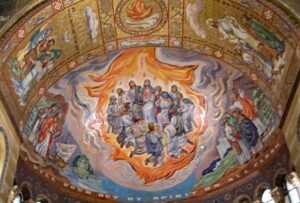“Raising his eyes toward his disciples Jesus said:
‘Blessed are you who are poor,
for the kingdom of God is yours.
Blessed are you who are now hungry,
for you will be satisfied.
Blessed are you who are now weeping,
for you will laugh.
Blessed are you when people hate you,
and when they exclude and insult you,
and denounce your name as evil
on account of the Son of Man.
Rejoice and leap for joy on that day!
Behold, your reward will be great in heaven.
For their ancestors treated the prophets in the same way.
But woe to you who are rich,
for you have received your consolation.
Woe to you who are filled now,
for you will be hungry.
Woe to you who laugh now,
for you will grieve and weep.
Woe to you when all speak well of you,
for their ancestors treated the false prophets in this way.’” Luke 6: 20-26
+++++
Three reflections on this Gospel passage:
Bishop Robert Barron
Bishop Barron’s book Catholicism: A Journey to the Heart of the Faith, Image Books, 2011, pp.43-47:
“Thomas Aquinas said that the four typical substitutes for God are wealth, pleasure, power, and honor.”
Question: Why do you think St. Thomas, a theologian and one of the greatest Catholic thinkers of all time, says that “wealth, pleasure, power and honor” are “substitutes for God”? Do you agree? Can you suggest other “substitutes for God”?
“When we try to satisfy the hunger for God with something less than God, we will naturally be frustrated, and then in our frustration, we will convince ourselves that we need more of that finite good, so we will struggle to achieve it, only to find ourselves again, necessarily, dissatisfied. At this point, a sort of spiritual panic sets in, and we can find ourselves turning obsessively around this creaturely good that can never in principle make us happy.
“And so Jesus says: ‘Blessed are the poor in spirit, for theirs is the kingdom of heaven’ (Mt 5:3). This is neither a romanticizing of economic poverty nor a demonization of wealth, but rather a formula for detachment. Might I suggest a somewhat variant rendition: how blessed are you if you are not attached to material things, if you have not placed the goods that wealth can buy at the center of your concern? When the Kingdom of God (love, mercy, grace) is your ultimate concern, not only will you not become addicted to material things; you will, in fact, be able to use them with great effectiveness for God’s purposes (love).
“Under this same rubric of detachment consider the beatitude ‘Blessed are they who mourn, for they will be comforted’ (Mt 5:4). Again, this can sound like the worst sort of masochism, but we have to dig deeper. We could render this adage as how blessed, how ‘lucky’… you are if you are not addicted to good feelings. Pleasant sensations – physical, emotional, psychological – are wonderful, but since they are only a finite good, they can easily drive an addiction, as can clearly be seen in the prevalence of psychotropic drugs, gluttonous habits of consumption, and pornography in our culture.
“Again, Jesus’s saying hasn’t a thing to do with puritanism; it has to do with detachment and hence with spiritual freedom. Unaddicted to sensual pleasure, one can unreservedly follow the will of God, even when such a path involves psychological or physical suffering.”
St. John Henry Newman
Parochial and Plain Sermons, Sermon 28: “The Danger of Riches”, St. John Heny Newman (1801 – 1890)
“But woe to you who are rich, for you have received your consolation.” Luke 6: 24
“The most obvious danger which worldly possessions present to our spiritual welfare is that they become practically a substitute in our hearts for that One Object to which our supreme devotion is due. They are present; God is unseen. They are means at hand of effecting what we want: whether God will hear our petitions for those wants is uncertain; or rather I may say, certain in the negative. Thus they minister to the corrupt inclinations of our nature; they promise and are able to be gods to us, and such gods, to as require no service, but, like dumb idols, exalt the worshipper, impressing him with a notion of his own power and security.”
Fr. Timothy Shugrue
February 13 Bulletin Column
“There is a very straightforward sense of justice in these paired ‘blessings’ and ‘woes’—one is advised neither to cling to one’s advantages nor to despair of ever knowing happiness. The passage from Jeremiah touches on the same theme: what appears to be a curse, may in fact turn out to be a blessing.
“For several years, until the COVID shutdown, I enjoyed a week or so of travel in the American Southwest, where the image in Jeremiah’s example comes to life: a dry and dusty landscape suddenly gives way to a ravine where a narrow or shallow stream supports a slice of lush terrain, with trees sinking roots deep to take advantage of underground water. Wisdom lies in not discounting the possibility that life can flourish despite the discouraging aspect of what appears on the surface. Trusting that deep water will be met, we can persevere in difficult and trying circumstances.
“In the same way, taking for granted that one’s advantages can always be relied on may be a sure path to disappointment in the future. “Blessed is the one who trusts in the Lord, whose hope is the Lord.”
“Patience—a difficult virtue to cultivate—steps back from the edge of panic or despair and trusts in the Lord to fulfill His promises. Jesus contrasts the reception given to authentic prophets and that offered to “false prophets”. His is a practical lesson: the ‘here and now’ is just that—‘here’ and ‘now’—and does not offer a permanent state.
“True security results from being open to the truth about a God Who judges justly, according to our grasp of what is really good and right. In the midst of realities that may look like ‘woes’, especially those imposed by the jealousy or discrimination of others, Jesus says, “Rejoice and leap for joy”, assured of a reward like that given the authentic prophets.”




